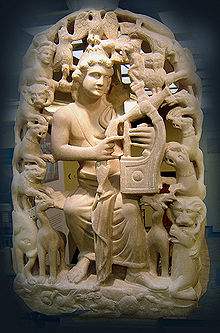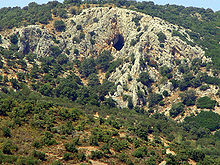- Orpheus
-
For other uses, see Orpheus (disambiguation).
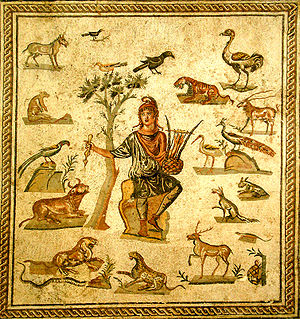 Roman mosaic depicting Orpheus, wearing a Phrygian cap and surrounded by the beasts charmed by the music of his lyre.
Roman mosaic depicting Orpheus, wearing a Phrygian cap and surrounded by the beasts charmed by the music of his lyre.
Orpheus (
 /ˈɔrfiːəs/ or /ˈɔrfjuːs/; Ancient Greek: Ὀρφεύς) was a legendary musician, poet, and prophet in ancient Greek religion and myth. The major stories about him are centered on his ability to charm all living things and even stones with his music; his attempt to retrieve his wife from the underworld; and his death at the hands of those who could not hear his divine music. As an archetype of the inspired singer, Orpheus is one of the most significant figures in the reception of classical mythology in Western culture, portrayed or alluded to in countless forms of art and popular culture including poetry, opera, and painting.[1]
/ˈɔrfiːəs/ or /ˈɔrfjuːs/; Ancient Greek: Ὀρφεύς) was a legendary musician, poet, and prophet in ancient Greek religion and myth. The major stories about him are centered on his ability to charm all living things and even stones with his music; his attempt to retrieve his wife from the underworld; and his death at the hands of those who could not hear his divine music. As an archetype of the inspired singer, Orpheus is one of the most significant figures in the reception of classical mythology in Western culture, portrayed or alluded to in countless forms of art and popular culture including poetry, opera, and painting.[1]To the Greeks, Orpheus was a founder and prophet of the so-called "Orphic" mysteries. He was credited with the composition of the Orphic Hymns, a collection of which survives. Shrines containing purported relics of Orpheus were regarded as oracles. Ancient Greek sources note Orpheus's Thracian origins.[2][3] Archaeologists have interpreted finds within ancient Thrace as evidence of Orphic cult.[4]
Contents
Background
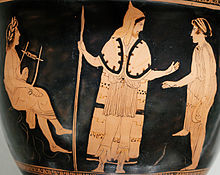 Orpheus (left, with lyre) among the Thracians, from an Attic red-figure [bell-krater (ca. 440 BC)[5]
Orpheus (left, with lyre) among the Thracians, from an Attic red-figure [bell-krater (ca. 440 BC)[5]
The earliest literary reference to Orpheus is a two-word fragment of the sixth-century BC lyric poet Ibycus: onomaklyton Orphēn ("Orpheus famous of name"). He is not mentioned in Homer or Hesiod.[6] Most ancient sources accept his historical existence; Aristotle is an exception.[7]
Pindar calls Orpheus "the father of songs"[8] and identifies him as a son of the Thracian king Oeagrus[9] and the Muse Calliope:[10] but as Karl Kerenyi observes, "in the popular mind he was more closely linked to the community of his disciples and adherents than with any particular race or family".[11]
Greeks of the Classical age venerated Orpheus as the greatest of all poets and musicians: it was said that while Hermes had invented the lyre, Orpheus perfected it. Poets such as Simonides of Ceos said that Orpheus' music and singing could charm the birds, fish and wild beasts, coax the trees and rocks into dance,[12] and divert the course of rivers. He was one of the handful of Greek heroes[13] to visit the Underworld and return; his music and song even had power over Hades.
Some sources credit Orpheus with further gifts to mankind: medicine, which is more usually under the aegis of Aesculapius; writing,[14] which is usually credited to Cadmus and agriculture, where Orpheus assumes the Eleusinian role of Triptolemus, giver of Demeter's knowledge to mankind. Orpheus was an augur and seer; practiced magical arts and astrology, founded cults to Apollo and Dionysus[15] and prescribed the mystery rites preserved in Orphic texts. In addition, Pindar and Apollonius of Rhodes[16] place Orpheus as the harpist and companion of Jason and the Argonauts. Orpheus had a brother named Linus who went to Thebes and became a Theban.[17]
Mythology
Early life
According to Apollodorus[18] and a fragment of Pindar,[19] Orpheus's father was Oeagrus, a Thracian king; or, according to another version of the story, the god Apollo. His mother was the muse Calliope; or, a daughter of Pierus,[20] son of Makednos. His birthplace and place of residence was in Pimpleia,[21][22][23] Olympus. In Argonautica the location of Oeagrus and Calliope's wedding is close to Pimpleia,[24] near Olympus.[25][26] While living with his mother and her eight beautiful sisters in Parnassus,[27] he met Apollo, who was courting the laughing muse Thalia. Apollo became fond of Orpheus and gave him a little golden lyre and taught him to play it. Orpheus's mother taught him to make verses for singing. Strabo mentions that he lived in Pimpleia.[25] He is also said to have studied in Egypt.[28]
Orpheus is said to have established the worship of Hecate in Aegina.[29] In Laconia Orpheus is said to have brought the worship of Demeter Chthonia[30] and that of the Kores Sōteiras (Greek,Κόρες Σωτείρας) savior maid.[clarification needed][31] Also in Taygetus a wooden image of Orpheus was said to have been kept by Pelasgians in the sanctuary of the Eleusinian Demeter.[32]
Traveling as an Argonaut
Main article: ArgonauticaThe Argonautica (Greek: Ἀργοναυτικά) is a Greek epic poem written by Apollonius Rhodius in the 3rd century BC. Orpheus took part in this adventure and used his skills to aid his companions. Chiron told Jason that without the aid of Orpheus, the Argonauts would never be able to pass the Sirens—the same Sirens encountered by Odysseus in Homer's epic poem the Odyssey. The Sirens lived on three small, rocky islands called Sirenum scopuli and sang beautiful songs that enticed sailors to come to them, which resulted in the crashing of their ships into the islands. When Orpheus heard their voices, he drew his lyre and played music that was louder and more beautiful, drowning out the Sirens' bewitching songs.
Death of Eurydice
See also: Descent to the underworldThe most famous story in which Orpheus figures is that of his wife Eurydice (sometimes referred to as Euridice and also known as Agricope). While walking among her people, the Cicones, in tall grass at her wedding, Eurydice was set upon by a satyr. In her efforts to escape the satyr, Eurydice fell into a nest of vipers and she suffered a fatal bite on her heel. Her body was discovered by Orpheus who, overcome with grief, played such sad and mournful songs that all the nymphs and gods wept. On their advice, Orpheus travelled to the underworld and by his music softened the hearts of Hades and Persephone (he was the only person ever to do so), who agreed to allow Eurydice to return with him to earth on one condition: he should walk in front of her and not look back until they both had reached the upper world. He set off with Eurydice following, and, in his anxiety, as soon as he reached the upper world, he turned to look at her, forgetting that both needed to be in the upper world, and she vanished for the second time, but now forever.
The story in this form belongs to the time of Virgil, who first introduces the name of Aristaeus (by the time of Virgil's Georgics, the myth has Aristaeus chasing Eurydice when she was bitten by a serpent) and the tragic outcome.[33] Other ancient writers, however, speak of Orpheus's visit to the underworld in a more negative light; according to Phaedrus in Plato's Symposium,[34] the infernal gods only "presented an apparition" of Eurydice to him. Ovid says that Eurydice's death was not caused by fleeing from Aristaeus but by dancing with naiads on her wedding day. In fact, Plato's representation of Orpheus is that of a coward, as instead of choosing to die in order to be with the one he loved, he instead mocked the gods by trying to go to Hades and get her back alive. Since his love was not "true"—he did not want to die for love—he was actually punished by the gods, first by giving him only the apparition of his former wife in the underworld, and then by being killed by women.
The story of Eurydice may actually be a late addition to the Orpheus myths. In particular, the name Eurudike ("she whose justice extends widely") recalls cult-titles attached to Persephone. The myth may have been derived from another Orpheus legend in which he travels to Tartarus and charms the goddess Hecate.[clarification needed][35]
This story also lead to the composition of the song Minuet and the Dance of the Blessed Spirits from Orfeo ed Euridice.
The descent to the Underworld of Orpheus is paralleled in other versions of a worldwide theme: the Japanese myth of Izanagi and Izanami, the Akkadian/Sumerian myth of Inanna's Descent to the Underworld, and Mayan myth of Ix Chel and Itzamna. The Nez Perce tell a story about the trickster figure, Coyote, that shares many similarities with the story of Orpheus and Eurydice.[36] This is but one theme present in a larger "North American Orpheus Tradition" in American Indian oral tradition.[37] The myth theme of not looking back, an essential precaution in Jason's raising of chthonic Brimo Hekate under Medea's guidance,[38] is reflected in the Biblical story of Lot's wife when escaping from Sodom. The warning of not looking back is also found in the Grimms' folk tale "Hansel and Gretel".[39] More directly, the story of Orpheus is similar to the ancient Greek tales of Persephone captured by Hades and similar stories of Adonis captive in the underworld. However, the developed form of the Orpheus myth was entwined with the Orphic mystery cults and, later in Rome, with the development of Mithraism and the cult of Sol Invictus.
Death
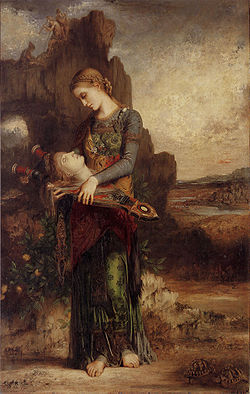 Thracian Girl Carrying the Head of Orpheus on His Lyre by Gustave Moreau (1865)
Thracian Girl Carrying the Head of Orpheus on His Lyre by Gustave Moreau (1865)
According to a Late Antique summary of Aeschylus's lost play Bassarids, Orpheus at the end of his life disdained the worship of all gods save the sun, whom he called Apollo. One early morning he went to the oracle of Dionysus at Mount Pangaion[40] to salute his god at dawn, but was ripped to pieces by Thracian Maenads for not honoring his previous patron (Dionysus) and buried in Pieria.[15] Here his death is analogous with the death of Pentheus. Pausanias writes that Orpheus was buried in Dion and that he met his death there.[41] He writes that the river Helicon sank underground when the women that killed Orpheus tried to wash off their blood-stained hands in its waters.[42]
Ovid also recounts that the Ciconian[43] women, Dionysus' followers, spurned by Orpheus, who had forsworn the love of women after the death of Eurydice and had taken only youths as his lovers,[44] first threw sticks and stones at him as he played, but his music was so beautiful even the rocks and branches refused to hit him. Enraged, the women tore him to pieces during the frenzy of their Bacchic orgies.[45] Medieval folkore put additional spin on the story: in Albrecht Dürer's drawing (illustration, right) the ribbon high in the tree is lettered Orfeus der erst puseran ("Orpheus, the first sodomite") an interpretation of the passage in Ovid where Orpheus is said to have been "the first of the Thracian people to transfer his love to young boys."[46]
His head and lyre, still singing mournful songs, floated down the swift Hebrus to the Mediterranean shore. There, the winds and waves carried them on to the Lesbos[47] shore, where the inhabitants buried his head and a shrine was built in his honour near Antissa;[48] there his oracle prophesied, until it was silenced by Apollo.[49]
The lyre was carried to heaven by the Muses, and was placed among the stars. The Muses also gathered up the fragments of his body and buried them at Leibethra[50] below Mount Olympus, where the nightingales sang over his grave. After the river Sys flooded[51] Leibethra, the Macedonians took his bones to Dion. His soul returned to the underworld, where he was reunited at last with his beloved Eurydice. Another legend places his tomb at Dion,[40] near Pydna in Macedon. In another version of the myth Orpheus travels to Aornum in Thesprotia, Epirus to an old oracle for the dead. In the end Orpheus commits suicide from his grief unable to find Eurydice.[52] Another account relates that he was struck with lightning by Zeus for having revealed the mysteries of the gods to men.[53]
In Strabo
Strabo[54] (64 BC – c. AD 24) surprisingly gives a more mundane telling of Orpheus's life, presenting him as a mortal, though he mentions that he was a "wizard" who lived and died in a village close to Olympus. He writes that he practiced his skill for money but later gathered followers and power that in the end killed him. He uses the word agurteuonta (αγυρτεύοντα),[55] a term used by Sophocles in Oedipus Tyrannus to characterize Teiresias as a trickster with an excessive desire for possessions. The word agurtēs (αγύρτης) most often meant charlatan[56] and always had a negative connotation.
Pausanias wrote of an Egyptian who also had the opinion that Orpheus was a magician, using the word mageuse (μάγευσε).[57]
A statue identified as Orpheus has been unearthed in Bulgaria, near a site archaeologists have proposed as the hero's tomb.[58]
Orphic poems and rites
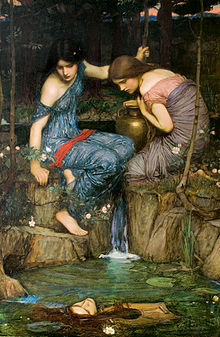 Nymphs Finding the Head of Orpheus, by John William Waterhouse
Nymphs Finding the Head of Orpheus, by John William Waterhouse Main article: Orphism (religion)
Main article: Orphism (religion)A number of Greek religious poems in hexameters were attributed to Orpheus, as they were to similar miracle-working figures, like Bakis, Musaeus, Abaris, Aristeas, Epimenides, and the Sibyl. Of this vast literature, only two examples survived whole: a set of hymns composed at some point in the second or third century AD, and an Orphic Argonautica composed somewhere between the fourth and sixth centuries AD. Earlier Orphic literature, which may date back as far as the sixth century BC, survives only in papyrus fragments or in quotations. Some of the earliest fragments may have been composed by Onomacritus.[59]
In addition to serving as a storehouse of mythological data along the lines of Hesiod's Theogony, Orphic poetry was recited in mystery-rites and purification rituals. Plato in particular tells of a class of vagrant beggar-priests who would go about offering purifications to the rich, a clatter of books by Orpheus and Musaeus in tow (Republic 364c-d). Those who were especially devoted to these ritual and poems often practiced vegetarianism and abstention from sex, and refrained from eating eggs and beans — which came to be known as the Orphikos bios, or "Orphic way of life".[60]
The Derveni papyrus, found in Derveni, Macedonia (Greece) in 1962, contains a philosophical treatise that is an allegorical commentary on an Orphic poem in hexameters, a theogony concerning the birth of the gods, produced in the circle of the philosopher Anaxagoras, written in the second half of the fifth century BC. Fragments of the poem are quoted making it "the most important new piece of evidence about Greek philosophy and religion to come to light since the Renaissance".[61] The papyrus dates to around 340 BC, during the reign of Philip II of Macedon, making it Europe's oldest surviving manuscript. The historian William Mitford wrote in 1784 that the very earliest form of a higher and cohesive ancient Greek religion was manifest in the Orphic poems.[62]
W.K.C. Guthrie wrote that Orpheus was the founder of mystery religions and the first to reveal to men the meanings of the initiation rites.[63]
Etymology
Several etymologies for the name Orpheus have been proposed. A probable suggestion is that it is derived from a hypothetical PIE verb *orbhao-, "to be deprived", from PIE *orbh-, "to put asunder, separate". Cognates would include Greek orphe, "darkness",[64] and Greek orphanos,[65] "fatherless, orphan", from which comes English "orphan" by way of Latin. Orpheus would therefore be semantically close to goao,[64] "to lament, sing wildly, cast a spell", uniting his seemingly disparate roles as disappointed lover, transgressive musician and mystery-priest into a single lexical whole. The word "orphic" is defined as mystic, fascinating and entrancing, and, probably, because of the oracle of Orpheus, "orphic" can also signify "oracular".[66] Fulgentius, a mythographer of the late 5th to early 6th century AD, gave the unlikely etymology meaning "best voice," "Oraia-phonos".[67]
See also
Notes
- ^ Geoffrey Miles, Classical Mythology in English Literature: A Critical Anthology (Routledge, 1999), p. 54ff.
- ^ Fritz Graf and Sarah Iles Johnston, Ritual Texts for the Afterlife: Orpheus and the Bacchic Gold Tablets (Routledge, 2007), p. 167, while taking note of depictions in Greek art, particularly vase painting, that show Orpheus attired as a Greek, often in contrast to those in Thracian dress around him.
- ^ Pausanias, Description of Greece, Corinth, 2.30.1
- ^ http://uni-sofia.academia.edu/PeterDelev/Papers/357792/The_Middle_Mesta_Region_in_Antiquity
- ^ Bell-krater, ca. 440 b.c.; red-figure, Attributed to the Painter of London E 497, Greek, Attic, Terracotta.
- ^ Ibycus, Fragments 17 (Diehl); M. Owen Lee, Virgil as Orpheus: A Study of the Georgics State University of New York Press, Albany (1996), p. 3.
- ^ Kathleen Freeman, Ancilla to the Pre-Socratic Philosophers, Harvard University Press (1948), p. 1.
- ^ Pindar, Pythian Odes, 4.4.315 [1]
- ^ Pindar fragment 126.9.
- ^ Pseudo-Apollodorus, Bibliotheke 1.3.2; Argonautica 1.23, and the Orphic Hymn 24,12.
- ^ Kerenyi, The Heroes of the Greeks 1959:279f.
- ^ Pseudo-Apollodorus, Bibliotheke 1.3.2; Euripides, Iphigeneia at Aulis, 1212 and The Bacchae, 562; Ovid, Metamorphoses 11: "with his songs, Orpheus, the bard of Thrace, allured the trees, the savage animals, and even the insensate rocks, to follow him>"
- ^ Others to brave the nekyia were Odysseus, Theseus and Heracles; Perseus also overcame Medusa in a chthonic setting.
- ^ A single literary epitaph, attributed to the sophist Alcidamas, credits Orpheus with the invention of writing. See Ivan Mortimer Linforth, "Two Notes on the Legend of Orpheus", Transactions and Proceedings of the American Philological Association 62, (1931):5-17).
- ^ a b Apollodorus (Pseudo Apollodorus), Library and Epitome, 1.3.2. "Orpheus also invented the mysteries of Dionysus, and having been torn in pieces by the Maenads he is buried in Pieria."
- ^ Apollonius, Argonautica, passim.
- ^ Apollodorus, Library and Epitome, 2.4.9, This Linus was a brother of Orpheus; he came to Thebes and became a Theban.
- ^ son of Oeagrus or Apollo and Calliope: Apollod. 1.3.1
- ^ Pindar, frag. 126, line 9, noted in Kerenyi 1959:280.
- ^ son of Muse Calliope or of daughter of Pierus: Paus. 9.30.4
- ^ Orpheus and Greek Religion (Mythos Books) by William Keith Guthrie and L. Alderlink, 1993, ISBN 0691024995, page 62
- ^ Orpheus and Greek Religion (Mythos Books) by William Keith Guthrie and L. Alderlink, 1993, ISBN 0691024995, page 61, "... is a city Dion. Near it is a village called Pimpleia.It was there they say that Orpheus the Kikonian lived ..."
- ^ Prolegomena to the Study of Greek Religion (Mythos Books) by Jane Ellen Harrison, 1991, ISBN 0691015147, page 469, "... and `near the city of Dium is a village called Pimpleia where Orpheus lived.... ..."
- ^ THE ARGONAUTICA, BOOK I,"(ll. 23-34) First then let us name Orpheus whom once Calliope bare, it is said, wedded to Thracian Oeagrus, near the Pimpleian height.
- ^ a b Prolegomena to the Study of Greek Religion (Mythos Books) by Jane Ellen Harrison, 1991, ISBN 0691015147, page 469,"... and `near the city of Dium is a village called Pimpleia where Orpheus lived.... ..."
- ^ Strabo, Geography Book 7, Chapter 7"The city Dium, in the foot-hills of Olympus, is not on the shore of the Thermaean Gulf, but is at a distance of as much as seven stadia from it. And the city Dium has a village near by, Pimpleia
- ^ The Greek Gods by Hoopes And Evslin , ISBN 0590441108, ISBN 0590441108, 1995, page 77 His father was a Thracian king; His mother the muse Calliope. For a while he lived on Parnassus with his mother and his eight beautiful aunts and there met Apollo who was courting the laughing muse Thalia. Apollo was taken with Orpheus, gave him his little golden lyre and taught him to play. And his mother taught him to make verses for singing.
- ^ Diodorus Siculus 4.25.2-4.
- ^ Pausanias, Description of Greece, Corinth, 2.30.1 [2] Of the gods, the Aeginetans worship most Hecate, in whose honor every year they celebrate mystic rites which, they say, Orpheus the Thracian established among them. Within the enclosure is a temple; its wooden image is the work of Myron,1 and it has one face and one body. It was Alcamenes,2 in my opinion, who first made three images of Hecate attached to one another, a figure called by the Athenians Epipurgidia (on the Tower); it stands beside the temple of the Wingless Victory.
- ^ Pausanias, Description of Greece, Laconia, 3.14.1,[5] but the wooden image of Thetis is guarded in secret. The cult of Demeter Chthonia (of the Lower World) the Lacedaemonians say was handed on to them by Orpheus, but in my opinion it was because of the sanctuary in Hermione4 that the Lacedaemonians also began to worship Demeter Chthonia. The Spartans have also a sanctuary of Serapis, the newest sanctuary in the city, and one of Zeus surnamed Olympian.
- ^ Pausanias, Description of Greece, Laconia, 3.13.1, Opposite the Olympian Aphrodite the Lacedaemonians have a temple of the Saviour Maid. Some say that it was made by Orpheus the Thracian, others by Abairis when he had come from the Hyperboreans.
- ^ Pausanias, Description of Greece, Laconia, 3.20.1,[5] Between Taletum and Euoras is a place they name Therae, where they say Leto from the Peaks of Taygetus ... is a sanctuary of Demeter surnamed Eleusinian. Here according to the Lacedaemonian story Heracles was hidden by Asclepius while he was being healed of a wound. In the sanctuary is a wooden image of Orpheus, a work, they say, of Pelasgians
- ^ M. Owen Lee, Virgil as Orpheus: A Study of the Georgics, State University of New York Press, Albany (1996), p. 9.
- ^ Symposium 179d.
- ^ Robert Graves, The Greek Myths, Penguin Books Ltd., London (1955), Volume 1, Chapter 28, "Orpheus", p. 115.
- ^ Lopez, Barry Holstun. Giving Birth to Thunder, Sleeping With His Daughter: Coyote Builds North America. Avon Books, 1977, pp. 131-134.
- ^ Wise, R. Todd, A Neocomparative Examination of the Orpheus Myth As Found in the Native American and European Traditions.UMI Press,1998
- ^ Apollonius of Rhodes, Argonautica, book III: "Let no footfall or barking of dogs cause you to turn around, lest you ruin everything", Medea warns Jason; after the dread rite, "The son of Aison was seized by fear, but even so he did not turn round..." (Richard Hunter, translator).
- ^ Brothers Grimm; Jack David Zipes, Johnny Gruelle (2003) [1987]. ""Hansel and Gretel"". In Zipes, Jack David. The Complete Fairy Tales of the Brothers Grimm (2nd ed.). New York: Bantam Books. p. 55. ISBN 0553382160. OCLC 55008642. "... "Hansel, why are you always stopping and looking around?" asked the father. "Keep going!"
- ^ a b Orpheus and Greek Religion by William Keith Guthrie and L. Alderlink, ISBN 0691024995, page 32
- ^ Pausanias, Description of Greece, Boeotia, 9.30.1,[7]The Macedonians who dwell in the district below Mount Pieria and the city of Dium say that it was here that Orpheus met his end at the hands of the women. Going from Dium along the road to the mountain, and advancing twenty stades, you come to a pillar on the right surmounted by a stone urn, which according to the natives contains the bones of Orpheus.
- ^ Pausanias, Description of Greece, Boeotia, 9.30.1,[8] There is also a river called Helicon. After a course of seventy-five stades the stream hereupon disappears under the earth. After a gap of about twenty-two stades the water rises again, and under the name of Baphyra instead of Helicon flows into the sea as a navigable river. The people of Dium say that at first this river flowed on land throughout its course. But, they go on to say, the women who killed Orpheus wished to wash off in it the blood-stains, and thereat the river sank underground, so as not to lend its waters to cleanse manslaughter
- ^ Ovid before exile: art and punishment in the Metamorphoses by Patricia Jane Johnson,2008,ISBN-0299224007,page 103,"by the Ciconian women."
- ^ Ovid - The Metamorphoses - Book X
- ^ Ovid - The Metamorphoses - Book XI
- ^ Ovid, Metamorphoses 10.85.
- ^ Carlos Parada," His head fell into the sea and was cast by the waves upon the island of Lesbos where the Lesbians buried it, and for having done this the Lesbians have the reputation of being skilled in music."
- ^ A site proposed as the oracle of Orpheus in Antissa was identified in the early 21st century; see Harissis H.V. et al. "The Spelios of Antissa; The oracle of Orpheus in Lesvos" Archaiologia kai Technes 2002;83:68-73 (article in Greek with English abstract)
- ^ Flavius Philostratus, Life of Apollonius of Tyana, 4.14.
- ^ The Writing of Orpheus: Greek Myth in Cultural Context by Marcele Detienne, ISBN 0801869544, page 161
- ^ Pausanias, Description of Greece, Boeotia, 9.30.1 [11] Immediately when night came the god sent heavy rain, and the river Sys (Boar), one of the torrents about Olympus, on this occasion threw down the walls of Libethra, overturning sanctuaries of gods and houses of men, and drowning the inhabitants and all the animals in the city. When Libethra was now a city of ruin, the Macedonians in Dium, according to my friend of Larisa, carried the bones of Orpheus to their own country.
- ^ Pausanias, Description of Greece, Boeotia, 9.30.1,[6] Others have said that his wife died before him, and that for her sake he came to Aornum in Thesprotis, where of old was an oracle of the dead. He thought, they say, that the soul of Eurydice followed him, but turning round he lost her, and committed suicide for grief. The Thracians say that such nightingales as nest on the grave of Orpheus sing more sweetly and louder than others.
- ^ Diogenes Laertius, Lives and Opinions of Eminent Philosophers, Introduction 4; Encyclopedia Britannica - 1911 Edition, Orpheus
- ^ Strabo, Geography Book 7, Chapter 7"The city Dium, in the foot-hills of Olympus, is not on the shore of the Thermaean Gulf, but is at a distance of as much as seven stadia from it. And the city Dium has a village near by, Pimpleia, where Orpheus lived. At the base of Olympus is a city Dium. And it has a village near by, Pimpleia. Here lived Orpheus, the Ciconian, it is said—a wizard who at first collected money from his music, together with his soothsaying and his celebration of the orgies connected with the mystic initiatory rites, but soon afterwards thought himself worthy of still greater things and procured for himself a throng of followers and power. Some, of course, received him willingly, but others, since they suspected a plot and violence, combined against him and killed him. And near here, also, is Leibethra. "
- ^ Archaic Period (Greek Literature, Volume 2) by Gregory Nagy, ISBN 0815336837, page 46
- ^ Index in Eustathii commentarios in Homeri Iliadem et Odysseam by Matthaeus Devarius, page 8
- ^ Pausanias, Description of Greece, 6.20.1,[18] A man of Egypt said that Pelops received something from Amphion the Theban and buried it where is what they call Taraxippus, adding that it was the buried thing which frightened the mares of Oenomaus, as well as those of every charioteer since. This Egyptian thought that Amphion and the Thracian Orpheus were clever magicians, and that it was through their enchantments that the beasts came to Orpheus, and the stones came to Amphion for the building of the wall. The most probable of the stories in my opinion makes Taraxippus a surname of Horse Poseidon.
- ^ http://www.guardian.co.uk/world/2005/jul/08/arts.artsnews
- ^ Kathleen freeman, Ancilla to the Pre-Socratic Philosophers, Harvard University Press (1948), p. 1.
- ^ Moore, p. 56 says that "the use of eggs and beans was forbidden, for these articles were associated with the worship of the dead".
- ^ Richard Janko, Bryn Mawr Classical Review, (2006) of K. Tsantsanoglou, G.M. Parássoglou, T. Kouremenos (editors), 2006. The Derveni Papyrus (Florence: Olschki) series "Studi e testi per il "Corpus dei papiri filosofici greci e latini", vol. 13).
- ^ Mitford, p.89: "But the very early inhabitants of Greece had a religion far less degenerated from original purity. To this curious and interesting fact, abundant testimonies remain. They occur in those poems, of uncertain origin and uncertain date, but unquestionably of great antiquity, which are called the poems of Orpheus or rather the Orphic poems [particularly in the Hymn to Jupiter, quoted by Aristotle in the seventh chapter of his Treatise on the World: Ζευς πρωτος γενετο, Ζευς υςατος, x. τ. ε]; and they are found scattered among the writings of the philosophers and historians." The idea of a religion "degenerated from original purity" expressed an Enlightenment idealisation of an assumed primitive state that is one connotation of "primitivism" in the history of ideas.
- ^ Guthrie, pp.17-18. "As founder of mystery-religions, Orpheus was first to reveal to men the meaning of the rites of initiation (teletai). We read of this in both Plato and Aristophanes (Aristophanes, Frogs, 1032; Plato, Republic, 364e, a passage which suggests that literary authority was made to take the responsibility for the rites)". Guthrie goes on to write about "This less worthy but certainly popular side of Orphism is represented for us again by the charms or incantations of Orpheus which we may also read of as early as the fifth century. Our authority is Euripides. We have already noticed the 'charm on the Thracian tablets' in the Alcestis and in Cyclops one of the lazy and frightened Satyrs, unwilling to help Odysseus in the task of driving the burning stake into the single eye of the giant, exclaims: 'But I know a spell of Orpheus, a fine one, which will make the brand step up of its own accord to burn this one-eyed son of Earth' (Euripides, Cyclops 646 = Kern, test. 83).".
- ^ a b Archetypal Imagination: Glimpses of the Gods in Life and Art by Noel Cobb, ISBN 0940262479, page 240
- ^ Myth and the polis by Dora Carlisky, ISBN 0801424739, page 46
- ^ Macmillan Dictionary for Students by Ltd. Pan Macmillan, ISBN 002761560X, page 711
- ^ Classical Mythology in English Literature: A Critical Anthology by Geoffrey Miles, ISBN 0415147557, 1999, page 57
Bibliography
- Pseudo-Apollodorus, Bibliotheke I, iii, 2; ix, 16 & 25;
- Apollonius Rhodius, Argonautica I, 23- 34; IV, 891-909.
- Bernabé, Albertus (ed.), Orphicorum et Orphicis similium testimonia et fragmenta. Poetae Epici Graeci. Pars II. Fasc. 1. Bibliotheca Teubneriana, München/Leipzig: K.G. Saur, 2004. ISBN 3-598-71707-5. review of this book
- Guthrie, William Keith Chambers, Orpheus and Greek Religion: a Study of the Orphic Movement, 1935.
- Kerenyi, Karl (1959). The Heroes of the Greeks. New York/London: Thames and Hudson.
- Mitford, William, The History of Greece, 1784. Cf. v.1, Chapter II, Religion of the Early Greeks.
- Moore, Clifford H., Religious Thought of the Greeks, 1916. Kessinger Publishing (April 2003). ISBN 978-0766151307
- Ossoli, Margaret Fuller, Orpheus, a sonnet about his trip to the underworld.
- Ovid, Metamorphoses X, 1-105; XI, 1-66;
- Rohde, Erwin, Psyche, 1925. cf. Chapter 10, The Orphics.
- Segal, Charles (1989). Orpheus : The Myth of the Poet. Baltimore: Johns Hopkins University Press. ISBN 0801837081.
- Smith, William; Dictionary of Greek and Roman Biography and Mythology, London (1873). "Orpheus"
- Taylor, Thomas [translator], The Mystical Hymns of Orpheus, 1896.
- West, Martin L., The Orphic Poems, 1983. There is a sub-thesis in this work that early Greek religion was heavily influenced by Central Asian shamanistic practices. One major point of contact was the ancient Crimean city of Olbia.
- Wise, R. Todd, A Neocomparative Examination of the Orpheus Myth As Found in the Native American and European Traditions, 1998. UMI. The thesis explores Orpheus as a single mythic structure present in traditions that extend from antiquity to contemporary times and across cultural contexts.
External links
- Greek Mythology Link, Orpheus
- Theoi Project: online text: The Orphic Hymns translated by Thomas Taylor
- The Life and Theology of Orpheus by Thomas Taylor - this link also has several Orphic Hymns and their accompanying notes by Taylor.
- Orphica in English and Greek, Select Resources
- Leibethra,The Tomb of Orpheus (in Greek)
Categories:- Characters in Book VI of the Aeneid
- Argonauts
- Greek mythology of Thrace
- Greek mythology
- Mount Olympus
- Ancient Greek shamans
- Primordial teachers
- Thraco-Macedonian mythology
- Heroes who ventured to Hades
- Offspring of Apollo
Wikimedia Foundation. 2010.


